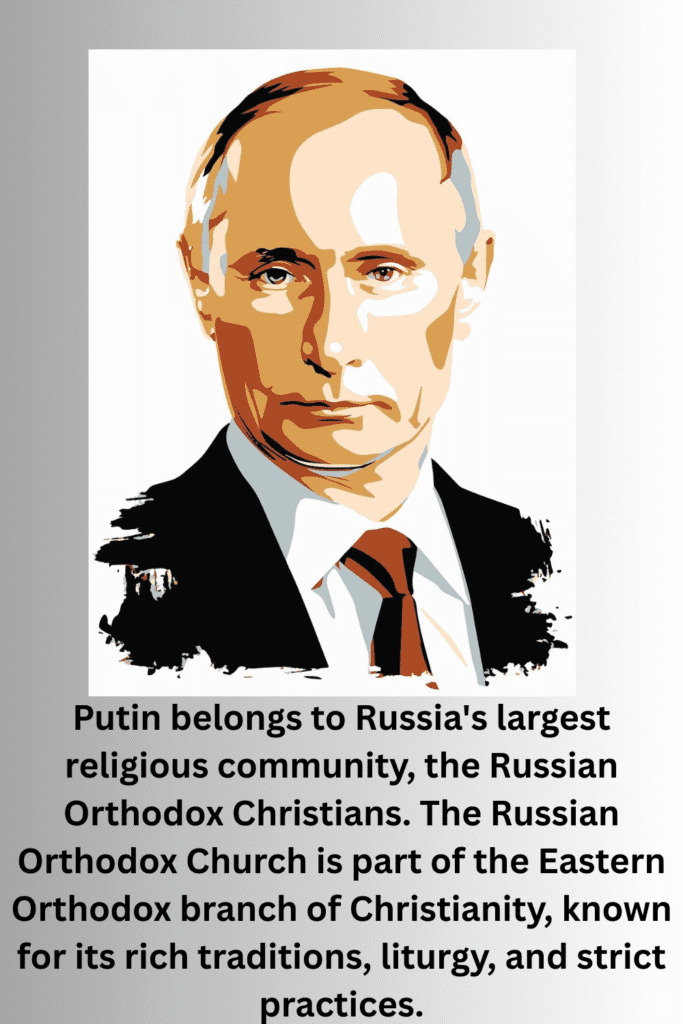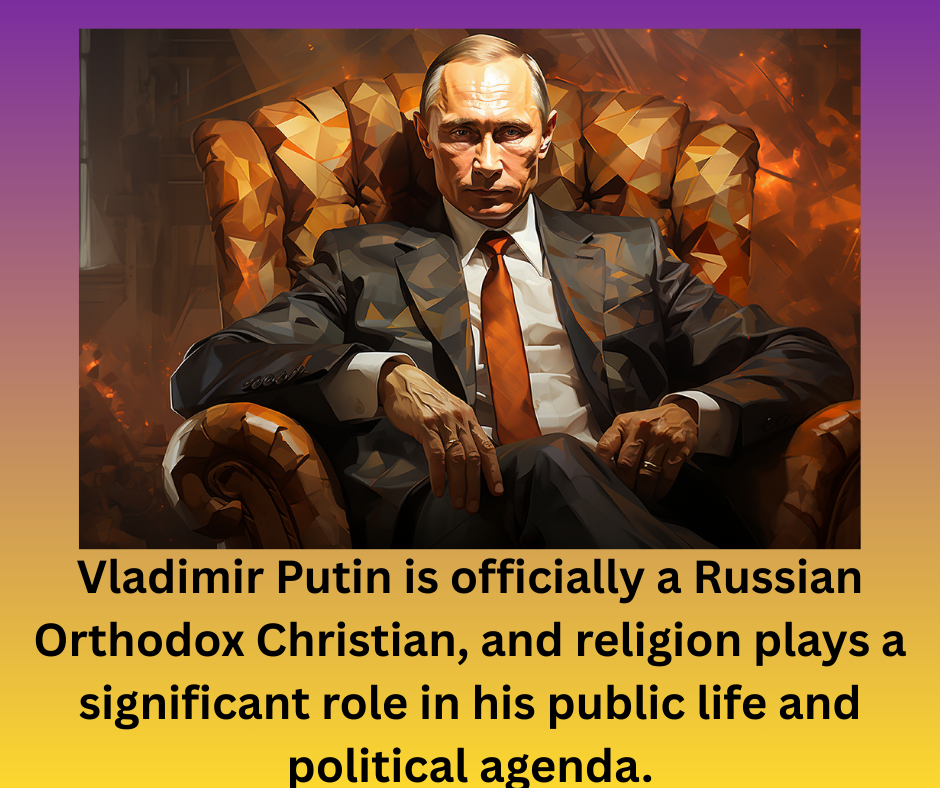Introduction
What religion is Putin,Religion often plays a subtle but powerful role in the lives of political leaders. One such figure whose religious identity has drawn global attention is Vladimir Putin, the President of Russia. Despite being the leader of a country that once suppressed religion during the Soviet era, Putin presents himself as a man of faith. But what exactly is his religion? Is he truly devout, or is his faith political in nature?

This article explores what religion Vladimir Putin practices, his religious upbringing, how Orthodox Christianity shapes his image, and the role of faith in Russian politics today.
Table of Contents
Vladimir Putin’s Religious Background
On October 7, 1952, Vladimir Vladimirovich Putin was born in the Soviet city of Leningrad (now Saint Petersburg). At the time, the USSR was officially atheist, and religious activities were discouraged or banned outright. Religious institutions were tightly monitored by the Communist regime.

Putin’s parents were baptized Orthodox Christians, but like most citizens during the Soviet era, they practiced their faith quietly and privately. What religion is Putin,It is reported that Putin’s mother secretly baptized him as a baby in the Russian Orthodox Church and gave him a small cross, which he still claims to wear.
Russian Orthodox Christianity
Putin belongs to Russia’s largest religious community, the Russian Orthodox Christians. The Russian Orthodox Church is part of the Eastern Orthodox branch of Christianity, known for its rich traditions, liturgy, and strict practices.
Key beliefs of Russian Orthodoxy include:
- Belief in the Father, Son, and Holy Spirit, also known as the Holy Trinity
- Veneration of icons (religious images)
- Emphasis on sacraments like baptism and communion
- Observance of fasting periods and holy days
- Devotion to saints and the Virgin Mary
Today, around 70% of Russians identify as Orthodox Christians, and the Church has grown more powerful since the fall of the Soviet Union.
Is Putin Truly Religious?
Putin has publicly emphasized his faith many times. He is seen attending church services, lighting candles, and participating in Orthodox holidays. He often speaks about God and traditional Christian values. Some key points:
- He claims to wear a baptismal cross necklace blessed in Jerusalem.
- He has said in interviews:
“There are things I believe in, which are traditional for Russia: the Orthodox faith, morality, and spirituality.”
He usually attends Easter and Christmas services at Russia’s biggest cathedrals.
However, some critics argue that Putin’s faith is more political than personal. They believe his religious image helps him:
- Appeal to conservative Russians
- Strengthen national identity
- Align with the powerful Russian Orthodox Church
- Frame Western nations as “morally corrupt”
So, while Putin may have personal religious beliefs, they are deeply intertwined with political strategy and national image-building.
The Russian Orthodox Church and Putin’s Power
What religion is Putin,One of the most fascinating aspects of Putin’s religious life is his close relationship with the Russian Orthodox Church and its leader, Patriarch Kirill.
Key Facts:
- The Church has called Putin’s leadership a “miracle of God.”
- Patriarch Kirill has strongly supported Putin’s policies, including his opposition to LGBTQ+ rights and Western liberalism.
- In return, Putin has restored the Church’s power, returning property seized during the Soviet era and funding cathedral construction.
This symbiotic relationship benefits both sides:
- The Church gains social and political influence.
- Putin gains moral authority and spiritual legitimacy.
This alliance is sometimes called “Orthodox Nationalism”, blending faith, patriotism, and identity to promote a powerful image of Russia.
Religion and Russian Politics
Under Putin, religion has become a tool for political unity and national pride. His government:
- Supports laws that protect religious values.
- Promotes Orthodox education in schools.
What religion is Putin,Minority faiths like Jehovah’s Witnesses are labeled as “extremist.” Russia sees itself as a protector of Christian culture, standing against Western secularism.
Putin has framed Russia’s mission as a moral and spiritual counterbalance to what he calls the declining values of the West.
Putin’s Use of Religion in Foreign Policy
Religion even plays a role in Russia’s foreign policy under Putin. For example:
- Ukraine Conflict:
Putin has utilized religion to justify his military actions in Ukraine. He claims that Russia is safeguarding the Orthodox Christian heritage of both nations. Additionally, he criticizes the Ukrainian Orthodox Church for opposing Moscow’s control. - Middle East Alliances:
Russia has positioned itself as a protector of Orthodox Christians in Syria, especially during the civil war. This move helped Putin present Russia as a global religious power. - Soft Power:
The Kremlin supports Orthodox Christian communities abroad and uses religion as a tool of soft power diplomacy.
Public Perception of Putin’s Religion
What religion is Putin,Among Russians, Putin’s religious image is generally well-received, especially among older generations and rural communities. Surveys show:
- Over 65% of Russians believe Putin defends traditional Christian values.
- Many see him as a spiritual leader, not just a political one.
However, younger Russians and secular citizens are more skeptical, viewing his religious displays as symbolic rather than genuine.
Conclusion
| Category | Details |
| Religion | Russian Orthodox Christianity |
| Baptism | Secretly baptized by his mother during Soviet times |
| Religious Practice | Attends Orthodox services, wears a cross |
| Public Image | Defender of Christian and national values |
| Political Use | Uses religion to promote unity, morality, and nationalism |
| Relationships with the Church strong ties to Patriarch Kirill and the Russian Orthodox Church |
Vladimir Putin is officially a Russian Orthodox Christian, and religion plays a significant role in his public life and political agenda. What religion is Putin,While there is debate over the depth of his personal faith, there is no doubt that religion serves as a powerful tool for shaping Russia’s identity, boosting national pride, and confronting Western ideologies.
Through his alliance with the Orthodox Church, his religious rhetoric, and symbolic actions, Putin has positioned himself not only as a political leader but also as a moral protector of the Russian soul.
In the modern world, where religion often fades from politics, Putin stands out as a leader who revives ancient religious symbolism for modern power. Whether this reflects true belief or strategic calculation, it continues to shape the fate of Russia—and the world.